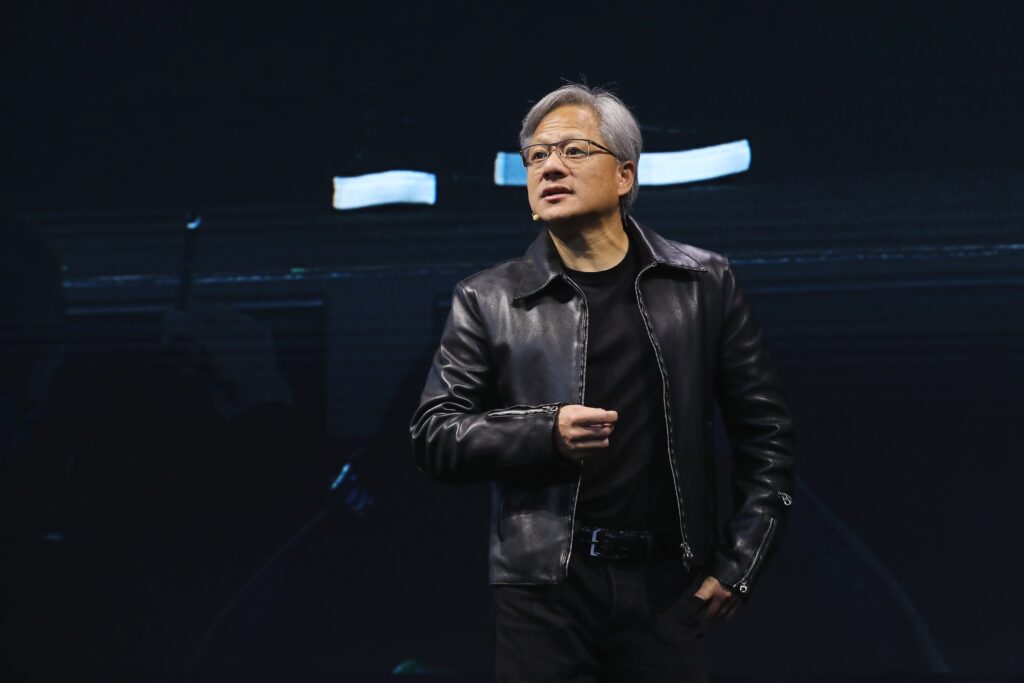Nvidia’s stock rose 5.6% on Tuesday after former U.S. President Donald Trump and Saudi Crown Prince Mohammed bin Salman revealed large-scale investments in artificial intelligence (AI) and other advanced technologies. The agreement, unveiled during a tech summit in Riyadh, includes tens of billions of dollars earmarked for AI, defense, energy, aerospace, and sports.
The news triggered a surge in Nvidia’s market value and sparked fresh optimism across the global tech sector.
Trump Leads U.S. Tech Delegation to Riyadh
Trump arrived in Saudi Arabia with a high-level delegation of U.S. tech leaders, including Nvidia CEO Jensen Huang and Tesla CEO Elon Musk. Executives from OpenAI, AMD, Palantir, and other major firms also participated in the visit.
During the summit, U.S. firms announced a series of strategic investment deals with Saudi Arabia. The White House confirmed that Saudi Arabia pledged $600 billion, with $80 billion focused specifically on cutting-edge technology development.
In a press conference, Trump called the initiative a “new era of U.S.-Gulf technology partnership” and confirmed upcoming visits to Qatar and the UAE to expand the cooperation.
Nvidia and Saudi Arabia Launch AI Megaprojects
A key highlight of the summit was Nvidia’s partnership with Saudi Arabia’s HUMAIN, an AI and robotics company backed by the kingdom’s Public Investment Fund. Under the agreement, Nvidia will supply 18,000 Grace Blackwell GB200 AI chips in the project’s first phase. These chips will power AI factories capable of reaching 500 megawatts in computing capacity.
The collaboration marks one of Nvidia’s largest single-country infrastructure investments to date. The chips are set to support AI research, robotics development, and smart city technology.
In addition, Nvidia entered a separate deal with the Saudi Data & AI Authority (SDAIA) to deliver 5,000 Blackwell GPUs. These GPUs will enable the development of a sovereign AI system and provide support for next-generation digital infrastructure.
Aramco Digital, the tech arm of Saudi oil giant Aramco, also joined Nvidia in building national-scale AI networks.
The deals align with Saudi Arabia’s Vision 2030, a strategic framework aiming to diversify the kingdom’s economy. As part of this vision, Saudi officials target $100 billion in annual foreign investment in technology and innovation sectors.
U.S. Policy Shift Boosts Chip Exports to Gulf States
The announcement coincided with a major policy change by the U.S. Commerce Department. Trump’s administration officially canceled the Biden-era AI chip export restrictions, which were set to begin this week. The rules had placed strict controls on selling high-end AI chips to countries like China, Saudi Arabia, and the UAE.
By scrapping the policy, Trump signaled a pivot towards AI diplomacy and stronger global tech alliances. A senior Commerce official stated the U.S. will “support allies and partners while blocking access to strategic technology for hostile powers.”
The decision opens the door to new export deals. Bloomberg reported that Trump may authorize a UAE import plan involving over one million Nvidia chips, a volume far exceeding previous export limits.
The Bureau of Industry and Security will now issue updated guidelines restricting chip sales to China and other designated rivals while easing restrictions on Gulf nations and close allies.
China Still Casts a Shadow
Despite the stock jump, Nvidia shares remain 4.5% down for the year, primarily due to ongoing U.S.-China tensions and increasing pressure from Chinese chipmakers like DeepSeek. Analysts say the new deals in the Gulf could help Nvidia offset declining access to the Chinese market.
Experts warn, however, that global chip supply chains remain vulnerable. Political shifts and trade restrictions may still impact delivery schedules and long-term growth.
What’s Next for Nvidia and Global AI Development?
The deals mark a significant boost for Nvidia’s international expansion. By partnering with Saudi Arabia, the company gains access to massive infrastructure investments, a young workforce, and a tech-friendly regulatory environment.
The agreements also signal growing interest among Gulf states to become AI leaders, investing not only in hardware but also in research, cloud platforms, and machine learning systems.
With Trump’s next visits scheduled in Qatar and the UAE, additional cooperation deals are likely to follow.
